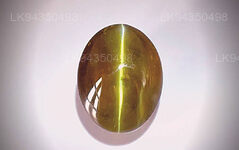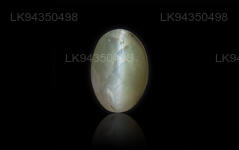
Gems
Sri Lanka’s gem industry has a very long and colorful history. Sri Lanka was affectionately known as Ratna-Dweepa which means Gem Island. The name is a reflection of its natural wealth. Marco Polo wrote that the island had the best sapphires, topazes, amethysts, and other gems in the world.
Cat’s Eye
A cat’s eye like effect, known as ‘chatoyancy’, appears to move on this stone’s surface. Cat’s eye is a gem variety of chrysoberyl. Hardness: 8.5 on the Mohs’ scale. A translucent variety of chrysoberyl (beryllium aluminum oxide) which exhibits a silvery white line across the stone. This moves as the stone, the light source or the observer moves and may appear to open and close like an eye. The finest quality has a sharp eye that appears to open and close as the stone is rotated, and exhibits a strong “milk and honey” effect (stone on one side of the eye appears lighter than the other). These colours switch as the stone or [light source is moved. The most highly prized body colours are greenish-yellow and brownish-yellow (honey colour).
- Varieties: There are generally two varieties of cat’s eye the alexandrite cat?s-eye and the chrysoberyl cat’s-eye, which is very popular in the Far East, particularly in Japan. The ideal colours of the chrysoberyl cat’s-eye are yellowish-brown, which is called the honey colour, and the yellow-green, which is called the apple green colour. A very good cat’s eye, apart from being of ideal colour, should have a high degree of transparency and a well-defined unbroken ray. It should be free from any distracting inclusions visible to the unaided eye. The chrysoberyl cat’s-eye is one of the most beautiful gemstones because of the chatoyancy or the eye effect.
- Sources: Sri Lanka, Brazil.
- Toughness: Excellent
- Phenomena:Chatoyancy caused by the reflection of light off minute, parallel, needle-like rutile crystals or hollow tubes.
- Miscellaneous: When a gem specimen exhibits both chatoyancy and change of colour, one or both phenomena will suffer. It is more common to find a good eye with poor change of colour. The conditions necessary for one phenomenon conflict with those needed for the other. The term cat’s eye when used alone refers to chrysoberyl. Other minerals exhibiting chatoyancy must be qualified, e.g. tourmaline cat’s eye.
- Cuts & Uses: Must be cut in a cabochon to produce cat’s eye effect. This should be cut so that the long portion of the cabochon is 90 degrees to the direction of the needles.
- History: Cat’s eye has been regarded as a preserver of good fortune. The natives of Sri Lanka still consider it a charm against evil spirits. British royalty often use it as an engagement stone.
Explore Gem Mines
-
Explore Gem Mines in Ratnapura from Negombo
常规价格 来自 ¥762.00 CNY常规价格单价 / 单价 -
Explore Gem Mines in Ratnapura from Colombo
常规价格 来自 ¥911.00 CNY常规价格单价 / 单价¥981.00 CNY促销价 来自 ¥911.00 CNY促销 -
Explore Gem Mines in Rathnapura from Kalutara
常规价格 来自 ¥1,131.00 CNY常规价格单价 / 单价¥1,413.00 CNY促销价 来自 ¥1,131.00 CNY促销 -
从拉维尼亚山探索拉特纳普勒的宝石矿
常规价格 来自 ¥1,318.00 CNY常规价格单价 / 单价¥1,647.00 CNY促销价 来自 ¥1,318.00 CNY促销






























